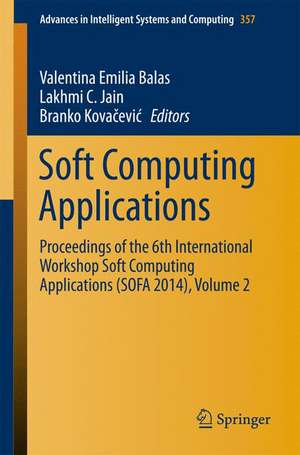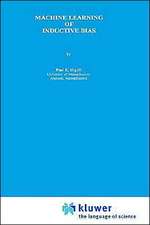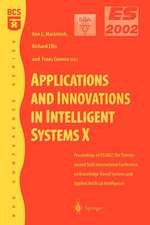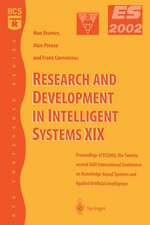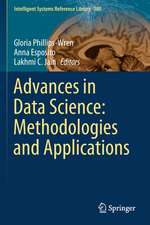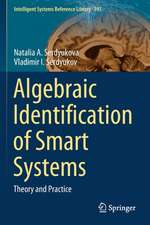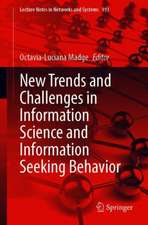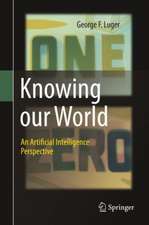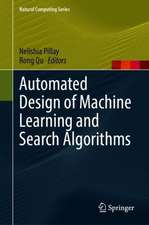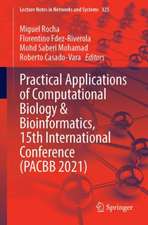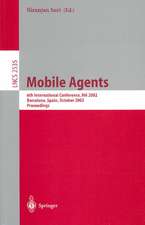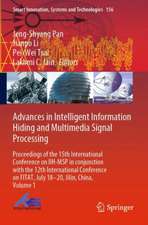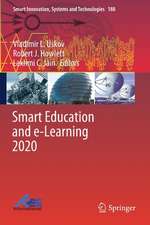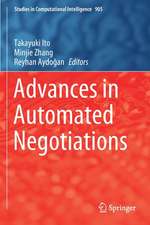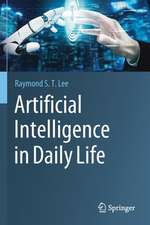Soft Computing Applications: Proceedings of the 6th International Workshop Soft Computing Applications (SOFA 2014), Volume 2: Advances in Intelligent Systems and Computing, cartea 357
Editat de Valentina Emilia Balas, Lakhmi C. Jain, Branko Kovačevićen Limba Engleză Paperback – 10 noi 2015
The Soft Computing concept was introduced by Lotfi Zadeh in 1991 and serves to highlight the emergence of computing methodologies in which the accent is on exploiting the tolerance for imprecision and uncertainty to achieve tractability, robustness and low solution cost. Soft computing facilitates the use of fuzzy logic, neurocomputing, evolutionary computing and probabilistic computing in combination, leading to the concept of hybrid intelligent systems. The combination of such intelligent systems tools and a large number of applications introduce a need for a synergy of scientific and technological disciplines in order to show the great potential of Soft Computing in all domains.
The conference papers included in these proceedings, published post conference, were grouped into the following area of research:
· Image, Text and Signal Processing
- Intelligent Transportation
- Modeling and Applications
- Biomedical Applications
- Knowledge-Based Technologies
- Soft Computing Techniques for Time Series Analysis
- Soft Computing and Fuzzy Logic in Biometrics
- Fuzzy Applications Theory and Fuzzy Control
- Business Process Management
- Methods and Applications in Electrical Engineering
| Toate formatele și edițiile | Preț | Express |
|---|---|---|
| Paperback (2) | 1009.28 lei 6-8 săpt. | |
| Springer International Publishing – 10 noi 2015 | 1009.28 lei 6-8 săpt. | |
| Springer International Publishing – 10 noi 2015 | 1290.72 lei 6-8 săpt. |
Din seria Advances in Intelligent Systems and Computing
- 20%
 Preț: 1120.90 lei
Preț: 1120.90 lei - 20%
 Preț: 1090.59 lei
Preț: 1090.59 lei - 20%
 Preț: 1324.07 lei
Preț: 1324.07 lei - 20%
 Preț: 1989.79 lei
Preț: 1989.79 lei - 20%
 Preț: 1946.92 lei
Preț: 1946.92 lei - 18%
 Preț: 1273.28 lei
Preț: 1273.28 lei - 20%
 Preț: 2264.51 lei
Preț: 2264.51 lei - 20%
 Preț: 1337.27 lei
Preț: 1337.27 lei - 20%
 Preț: 1297.67 lei
Preț: 1297.67 lei - 20%
 Preț: 1315.82 lei
Preț: 1315.82 lei - 20%
 Preț: 1310.88 lei
Preț: 1310.88 lei - 20%
 Preț: 1302.62 lei
Preț: 1302.62 lei - 20%
 Preț: 882.20 lei
Preț: 882.20 lei - 20%
 Preț: 1305.93 lei
Preț: 1305.93 lei - 20%
 Preț: 1629.32 lei
Preț: 1629.32 lei - 20%
 Preț: 1345.49 lei
Preț: 1345.49 lei - 18%
 Preț: 1227.52 lei
Preț: 1227.52 lei - 18%
 Preț: 1290.64 lei
Preț: 1290.64 lei - 20%
 Preț: 1041.10 lei
Preț: 1041.10 lei - 20%
 Preț: 1034.52 lei
Preț: 1034.52 lei - 20%
 Preț: 1298.50 lei
Preț: 1298.50 lei - 20%
 Preț: 1330.67 lei
Preț: 1330.67 lei - 20%
 Preț: 1483.28 lei
Preț: 1483.28 lei - 20%
 Preț: 1971.64 lei
Preț: 1971.64 lei - 20%
 Preț: 1006.48 lei
Preț: 1006.48 lei - 20%
 Preț: 1471.75 lei
Preț: 1471.75 lei - 20%
 Preț: 1471.56 lei
Preț: 1471.56 lei - 20%
 Preț: 1454.40 lei
Preț: 1454.40 lei - 20%
 Preț: 1494.84 lei
Preț: 1494.84 lei - 20%
 Preț: 1269.64 lei
Preț: 1269.64 lei - 20%
 Preț: 1481.64 lei
Preț: 1481.64 lei - 20%
 Preț: 1192.08 lei
Preț: 1192.08 lei - 20%
 Preț: 1298.50 lei
Preț: 1298.50 lei - 20%
 Preț: 1489.07 lei
Preț: 1489.07 lei - 20%
 Preț: 825.78 lei
Preț: 825.78 lei - 20%
 Preț: 1649.93 lei
Preț: 1649.93 lei - 20%
 Preț: 1463.49 lei
Preț: 1463.49 lei - 20%
 Preț: 1438.77 lei
Preț: 1438.77 lei - 20%
 Preț: 1474.22 lei
Preț: 1474.22 lei - 20%
 Preț: 1298.50 lei
Preț: 1298.50 lei - 20%
 Preț: 1327.35 lei
Preț: 1327.35 lei - 20%
 Preț: 1973.31 lei
Preț: 1973.31 lei - 18%
 Preț: 947.04 lei
Preț: 947.04 lei - 18%
 Preț: 1441.39 lei
Preț: 1441.39 lei - 20%
 Preț: 638.55 lei
Preț: 638.55 lei - 20%
 Preț: 1320.76 lei
Preț: 1320.76 lei - 20%
 Preț: 1948.56 lei
Preț: 1948.56 lei
Preț: 1290.72 lei
Preț vechi: 1613.41 lei
-20% Nou
Puncte Express: 1936
Preț estimativ în valută:
247.06€ • 268.45$ • 207.66£
247.06€ • 268.45$ • 207.66£
Carte tipărită la comandă
Livrare economică 21 aprilie-05 mai
Preluare comenzi: 021 569.72.76
Specificații
ISBN-13: 9783319184159
ISBN-10: 3319184156
Pagini: 500
Ilustrații: XXI, 1381 p. 321 illus., 202 illus. in color.
Dimensiuni: 155 x 235 x 40 mm
Greutate: 0.94 kg
Ediția:1st ed. 2016
Editura: Springer International Publishing
Colecția Springer
Seria Advances in Intelligent Systems and Computing
Locul publicării:Cham, Switzerland
ISBN-10: 3319184156
Pagini: 500
Ilustrații: XXI, 1381 p. 321 illus., 202 illus. in color.
Dimensiuni: 155 x 235 x 40 mm
Greutate: 0.94 kg
Ediția:1st ed. 2016
Editura: Springer International Publishing
Colecția Springer
Seria Advances in Intelligent Systems and Computing
Locul publicării:Cham, Switzerland
Public țintă
ResearchCuprins
Soft Computing Techniques for Time Series Analysis.- Soft Computing and Fuzy Logic in Biometrics.- Fuzzy Applications Theory and Fuzzy Control.- Bussiness Process Management.- Methods and Applications in Electrical Engineering.
Textul de pe ultima copertă
These volumes constitute the Proceedings of the 6th International Workshop on Soft Computing Applications, or SOFA 2014, held on 24-26 July 2014 in Timisoara, Romania. This edition was organized by the University of Belgrade, Serbia in conjunction with Romanian Society of Control Engineering and Technical Informatics (SRAIT) - Arad Section, The General Association of Engineers in Romania - Arad Section, Institute of Computer Science, Iasi Branch of the Romanian Academy and IEEE Romanian Section.
The Soft Computing concept was introduced by Lotfi Zadeh in 1991 and serves to highlight the emergence of computing methodologies in which the accent is on exploiting the tolerance for imprecision and uncertainty to achieve tractability, robustness and low solution cost. Soft computing facilitates the use of fuzzy logic, neurocomputing, evolutionary computing and probabilistic computing in combination, leading to the concept of hybrid intelligent systems.The combination of such intelligent systems tools and a large number of applications introduce a need for a synergy of scientific and technological disciplines in order to show the great potential of Soft Computing in all domains.
The conference papers included in these proceedings, published post conference, were grouped into the following area of research:
· Image, Text and Signal Processing
Knowledge-Based Technologies for Web Applications, Cloud Computing, Security, Algorithms and Computer Networks Methods and Applications in Electrical Engineering The volumes provide useful information to professors, researchers and graduated students in area of soft computing techniques and applications, as they report new research work on challenging issues.
The Soft Computing concept was introduced by Lotfi Zadeh in 1991 and serves to highlight the emergence of computing methodologies in which the accent is on exploiting the tolerance for imprecision and uncertainty to achieve tractability, robustness and low solution cost. Soft computing facilitates the use of fuzzy logic, neurocomputing, evolutionary computing and probabilistic computing in combination, leading to the concept of hybrid intelligent systems.The combination of such intelligent systems tools and a large number of applications introduce a need for a synergy of scientific and technological disciplines in order to show the great potential of Soft Computing in all domains.
The conference papers included in these proceedings, published post conference, were grouped into the following area of research:
· Image, Text and Signal Processing
- Intelligent Transportation
- Modeling and Applications
- Biomedical Applications
- Knowledge-Based Technologies
- Soft Computing Techniques for Time Series Analysis
- Soft Computing and Fuzzy Logic in Biometrics
- Fuzzy Applications Theory and Fuzzy Control
- Business Process
Caracteristici
Presents recent applications of Soft Computing Proceedings of the 6th International Workshop Soft Computing Applications (SOFA 2014), held July 24-26, 2014 in Timisoara, Romania Presents new theoretical and applicative research results, in the areas of Fuzzy Logic, Neural Networks, Evolutionary Computing, and other Includes supplementary material: sn.pub/extras
